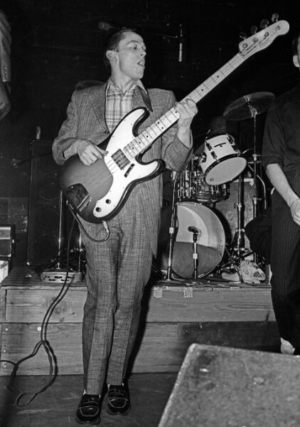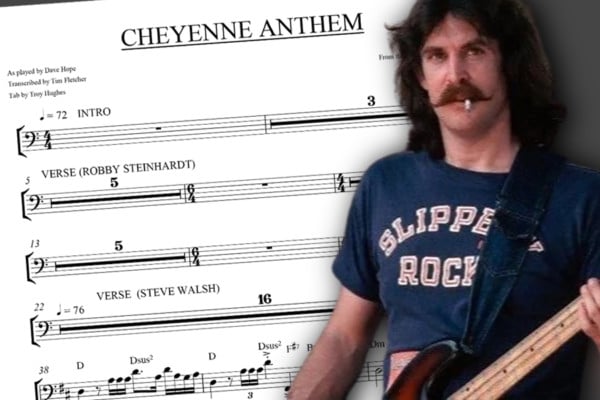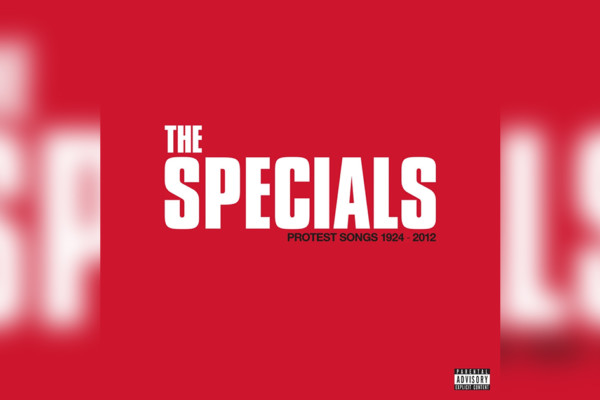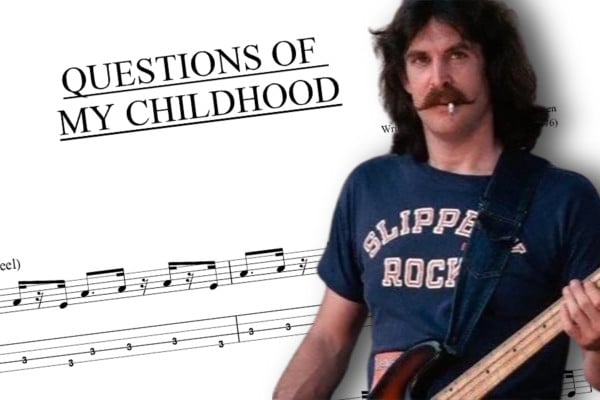Bass Transcription: Horace Panter’s Bass Line on “Ghost Town” by The Specials
 The Specials were perhaps the defining band of the late 70s British Ska movement, and they had a run of hit singles and albums between 1979 and 1984. Their band leader and principal songwriter Jerry Dammers was also the founder of Two-Tone Records, an independent label that helped to push the genre into the mainstream. The Specials were a multi-racial group at a time when this was relatively uncommon, and their songs reflected the experiences of both the black and white members of the band. They were strongly influenced by Jamaican music, and their first hit single “Gangsters”, was an adaptation of Prince Buster’s “Al Capone”. The band was also inspired by the punk attitude and ethos, and under their previous name “The Automatics” had supported The Clash on their 1978 UK tour.
The Specials were perhaps the defining band of the late 70s British Ska movement, and they had a run of hit singles and albums between 1979 and 1984. Their band leader and principal songwriter Jerry Dammers was also the founder of Two-Tone Records, an independent label that helped to push the genre into the mainstream. The Specials were a multi-racial group at a time when this was relatively uncommon, and their songs reflected the experiences of both the black and white members of the band. They were strongly influenced by Jamaican music, and their first hit single “Gangsters”, was an adaptation of Prince Buster’s “Al Capone”. The band was also inspired by the punk attitude and ethos, and under their previous name “The Automatics” had supported The Clash on their 1978 UK tour.
Their debut album The Specials (1979) included covers of reggae and ska staples such as Dandy Livingstone’s “A Message to You Rudy” and Toots and the Maytals’ “Monkey Man”. It also showcased the band’s original material, which updated the Jamaican sound with a new “punk” edge. Their own songs showed a more political slant than the covers and included songs about teenage pregnancy (“Too Much, Too Young”), violence (“Why”), and urban deprivation and the rise of the British right wing (“Concrete Jungle”). This album was a critical and commercial success, and their second album More Specials (1980) helped to cement their position in the charts – although Dammers’ insistence in using “muzak”-style keyboard sounds on this album was a source of conflict with some of the band members. Their UK tour in 1980 enhanced their reputation as an exciting live act, although many of the gigs were disrupted by violence from more extreme right-wing elements in the audience. The tour coincided with both a deep recession in the UK and outbreaks of rioting in the inner cities, and Dammers noticed the deprivation in many parts of the country they visited. Prompted by what he had seen, he began to write a song that would become both the band’s greatest artistic statement and the catalyst for change in the band’s lineup.
“Ghost Town” was written and arranged by Dammers, and his vision for the song included jazzy dissonant chords and a downbeat, minor sounding arrangement influenced by the work of film composer John Barry. Some of the band members resented this radical change from their previous material, and the sessions for the song were fraught, with arguments amongst the band members and with the producer. However, the final product was a commercial and critical triumph. On its release, the song reached number one in the UK where it stayed for four weeks, and eventually sold one million copies. The song also reached the top ten in Ireland and Norway and charted in New Zealand, Australia, Belgium and the Netherlands. It was also voted song of the year 1981 by the UK music press and remains one of the highlights of the band’s career.
The success of the track was marred by three of the band – Terry Hall, Lynval Golding, and Neville Staple – announcing their departure from the band when they appeared on the BBC’s flagship music show “Top of the Pops” to promote the song. This led the following album In the Studio (1984) to be credited to “The Special AKA,” and was recorded with a more varied and flexible line-up. Unlike previous albums, the songs had not been written before the band entered the studio, and the lack of direction led to Panter leaving the band in frustration two weeks into the sessions. Although a major hit single “Free Nelson Mandela” was taken from the album, the further changes of sound and style did not produce the commercial success of their previous work, and Dammers eventually disbanded the group to focus on political activism in opposition to the apartheid system in South Africa.
The Specials’ bassist, Horace Panter (real name Stephen Panter, but also known in The Specials as “Sir Horace Gentleman”) was born in Croydon, South London in 1953, but was raised in Kettering in the East Midlands. He was a self-described “pop music nut” as a child, listening avidly to the new pop-oriented radio stations that were cropping up in the UK at the time. His first bass was a semi-acoustic Rosetti Bass 8, and his first band, Mobius, (for which he was also the vocalist) played covers of contemporary rock bands like Cream and Free. This band played on the local circuit for two years, the highlight of which was supporting Mott the Hoople. After school, Panter attended Lanchester Polytechnic (now Coventry University) as an art student, where he met Dammers for the first time, although the two musicians only had brief musical contact. During his time at college, Panter joined a band that had some success in a national band competition, but this did not lead to any label interest, and on completion of their studies, the band split. Panter wished to continue as a working bassist and joined Breaker, a band that played the club circuit around the UK. Panter describes this as the “graveyard of light entertainment” and although it paid the bills, it was hard work and uninspiring. Dammers was also playing in a similar band and, wanting to escape from the club circuit and play original material, and he began to put together a new band. Dammers called up his former college friend to take part in this new project, which eventually became The Specials.
After The Specials disbanded, Panter formed General Public with Dave Wakeling and Ranking Roger of contemporaries The Beat, and also played in Box of Blues with Neol Davis of The Selecter. He later re-trained as an art teacher and spent ten years working with children with special needs. The original line-up of The Specials re-formed in 2009, without Dammers, and Panter continues to play with them to the present day. In 2014, Panter founded The Uptown Ska Collective, a nine-piece “ska orchestra,” and currently plays in blues band Blues 2 Go. Outside of his music career, Panter has been a successful painter and has also written his autobiography: Ska’d For Life.
Panter cites Andy Fraser of Free, Tony Jackson of The Searchers, Aston Barrett of The Wailers, and also James Jamerson and Duck Dunn and as influences on his playing. During his career, Panter has mainly played Fender Precision basses but has also used Fender Jazz, Fender Mustang and Gibson Thunderbird instruments.
“Ghost Town” starts with a chromatically rising sequence of diminished chords (F#dim, Gdim, G#dim, Adim, A#dim and Bdim), although the bass notes change their position in the chord as the sequence develops; root, third, fifth, seventh, root, third. This adds to the feeling of instability but enables the bass to create a line that has its own shape rather than following the roots.
In the verses, Panter plays a subtle and interesting bass line that includes some tasteful and effective ideas. Initially, he plays a root and third for the Cm chord and then cleverly avoids the root in the G7b9, choosing instead to play the fifth, third, seventh and flat ninth. In the next bar he plays the fifth first and then the root of the Cm, and then the fifth and third of the G7b9 which leads back nicely to the root of the Cm in the next bar.
After the key change into Db major at bar 30, the song briefly becomes more uplifting, with an almost Latin American feel, and the bass line becomes more fluid, filling out the bars more completely. The more downbeat reggae feel returns at bar 34, and Panter utilizes the same approaches he used in the earlier sections for much of the remainder of the song.
Panter’s ability to create both movement and space in the bass-line helps to support the darker feel of the track; he creates a solid and supportive groove but also uses a range of ideas to keep the line interesting.
Download the transcription and follow along with the video:


